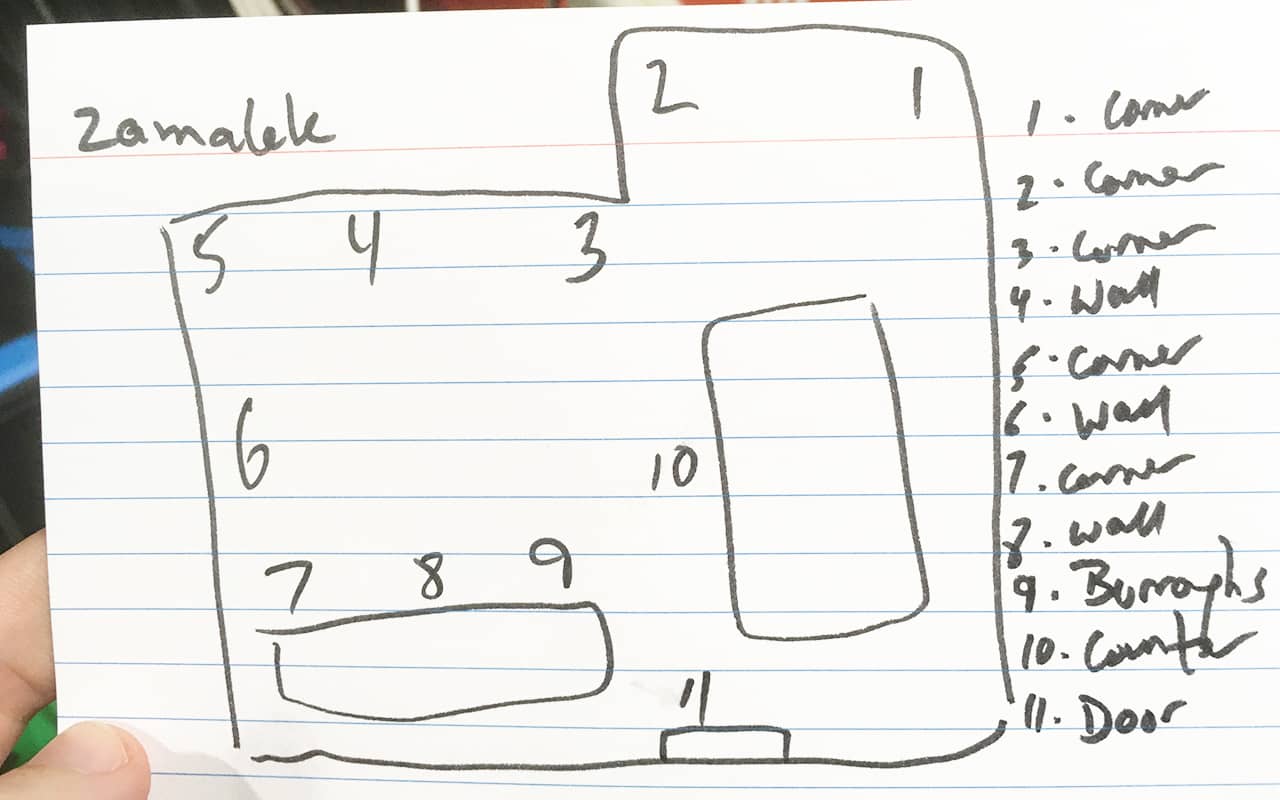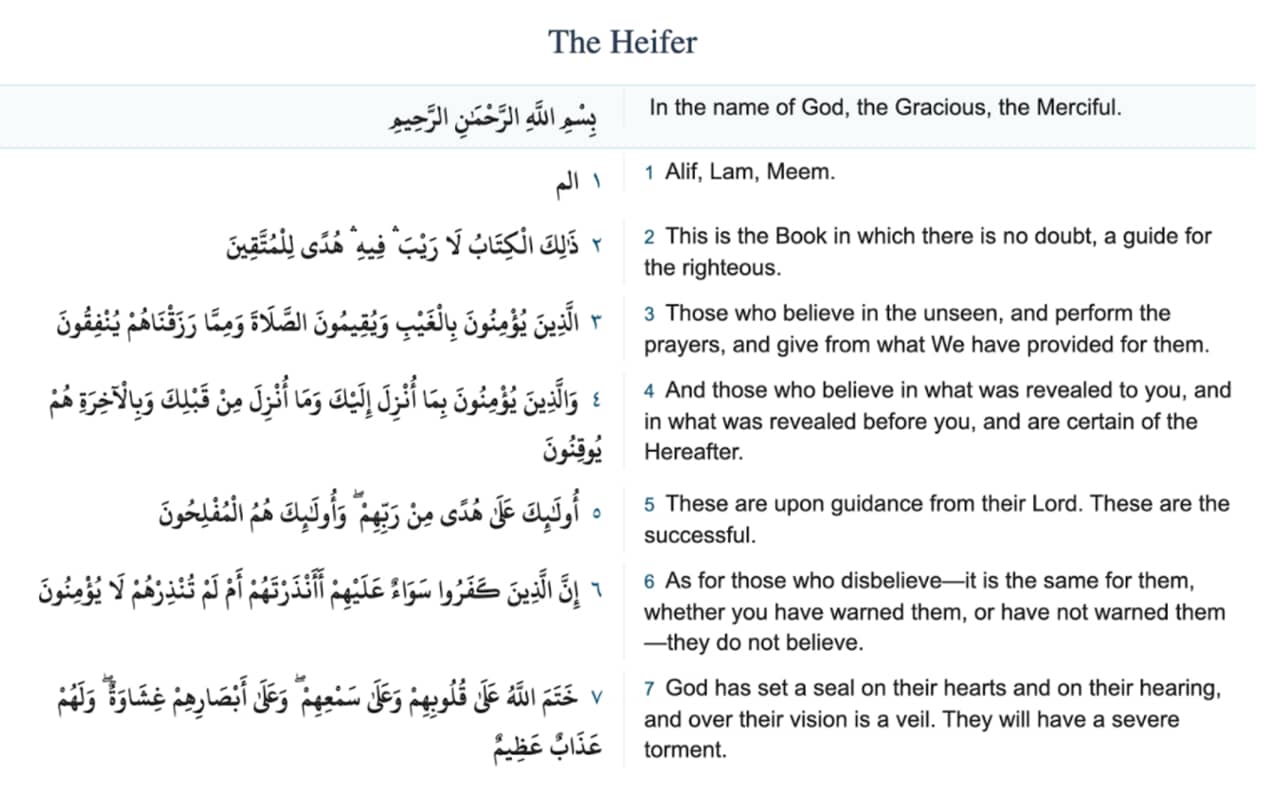 Most people who successfully memorize the Quran take way longer than necessary.
Most people who successfully memorize the Quran take way longer than necessary.
That’s because they don’t use the techniques you’re about to learn on this page.
The simple process you’re about to discover is not only fast. It also makes memorizing the Quran a lot more fun.
Don’t worry if you’ve found this learning task overwhelming in the past.
That’s normal. After all, you’re looking at 77,430 words.
However, if you’re prepared with the right techniques and have your mindset configured correctly, you’ll be amazed by how quickly you can proceed. Even through that amount of text.
After all, unlike many other texts, the lines in the Quran are usually quite short. A lot of material is repeated too, which creates a number of hacks you can harness.
Let’s dive in.
How to Memorize the Quran: My Top Memorization Techniques
Bukhaaree reportedly said, “The best amongst you is the one who learns the Qur’aan and teaches it.”
This is a good point to keep in mind because, before getting started, it’s helpful to know why you want to memorize the Quran.
Have you put some thought into the question?
It’s important because all the tips in the world won’t really help if your intention is out of alignment with reality. But when you keep your “why” in mind, you will improve your mental clarity, concentration and success with using memory techniques.
As I often let my private clients know, it’s also okay to extract the “greatest hits” from a book like the Quran, especially when you’re just beginning your memorization journey. This chunking down approach is especially helpful if you also need to learn Arabic at the same time.
But if you’re going for the whole text, here’s what I suggest:
One: Pick An Audio Visual Source For The Quran
You’ll want to have the Quran visible and audible when working with it. Different people respond differently to how information is displayed, so it might take some time to find a source that works for you.
Of all the ones I’ve seen, Quranful is one of the best because it presents everything in a way that is easy to read and navigate.
To get a good overview, it’s best to use a desktop computer or a laptop for this website.
If you prefer print books, you’ll want to make sure that the audio recording order matches the edition you’ve ordered.
Two: Create A Big Enough Memory Palace Network In Advance
In order to reduce the cognitive load and eliminate boring, tedious rote learning, you’ll want to use the Memory Palace technique.
This technique allows you to turn space into a kind of “container” for holding the verses of the Quran in your memory so you can get it into long term memory.
You’ll also want to develop skills with elaborative encoding or making associations with something like the pegword method.
Can you memorize the Quran without the Memory Palace technique?
Possibly. But I couldn’t personally do it.

The most I’ve seen from one of my students is when Mike McKinely memorized 66 Psalms without using any at all. However, if you listen to our discussion, you’ll notice that I think he’s still using the foundations of the technique in an implicit way.
Three: Memorize In Individual Passages, In Order
Unless you’re extracting a part of the text, which again, is a perfectly valid strategy, you’ll want to start at the beginning and work forward.
This will reduce many issues and help you design your Memory Palace Networks accordingly.
It’s practically impossible to know how many you’ll need for the entire Quran, so I recommend that of all the Quran memorization techniques you pursue, you learn the technique of starting small.
For example, starting with al-Fatihah is a good idea. It’s only 7 lines and one of those lines will repeat many times.
This will allow you to get started with a very simple Memory Palace like this:

Once you have the journey laid out, it’s just a matter of encoding each and every word in order.
Four: Create Your Own Homophonic Transliterations
There are many English transliterations of the Quran freely available online. These can be very frustrating to memorize from, however. Sure, you can add the task of learning the Arabic transliteration rules if you want, but why add another task if you don’t have to?
For example of how frustrating the standard transliterations can be, look at this typical example from the Fatiha (the opening):
Bismillaahir Rahmaanir Raheem
(In the name of God, the Gracious, the Merciful)
That reads fine and dandy, but doesn’t sound at all like what I hear in my ear. By creating my own homophonic transliteration, it’s much easier to create something memorizable:
Bis mill-la yo wha-ck man yo wha-ck heem
Now, this isn’t perfect. But memorizing long form texts is not a game of perfectionism. It’s about finding ways to continually progress so you can consistently move forward.
Five: Treat Memorizing The Quran Like Stringing Beads
One way to approach the Memory Palace technique is to treat it like a string that you’re beading. Each word is a bead in a beautiful necklace.
With practice, you’ll learn to memorize multiple words at the same time with far fewer images than the words involved.
However, even at advanced levels, you’ll still sometimes need to treat the process as one word at a time.
Let’s look at the first sentence of the Fatiha so I can show you a detailed example.
Bis mill-la yo wha-ck man yo wha-ck heem

The associations I’ve chosen are all based on alphabetical correspondences:
- Bis = Bishop from Aliens
- Mill = Detective Mills from Seven with an LA map and a yoyo
- He’s using this to whack Johnny Cash (i.e. the “Man in Black”)
- Johnny Cash then grabs the yoyo to attack Jaoquin Phoenix
This might seem like a complicated set of associations, but it’s really just like adding beads to a string. By focusing on the sound similarities between the Arabic of the Quran and pop culture that is already in my memory, the process becomes fun and easy.
Six: Add Meaning After Establishing The Sound
If you already know Arabic, then you can skip this step. But if you don’t, I highly recommend you focus on the Arabic first, then add the English meaning.
To do this, you want to think about how the initial scenario of associations you created can include the meaning. In this case, the first line means:
In the name of God, the Gracious, the Merciful
It’s a simple affair to have Bishop singing a certain song by Rage Against the Machine that includes the phrase, “in the name of.” God doesn’t really need an association because it’s obvious from the context, but if wanted or needed it, all of this can be taking place in the Sistine Chapel.
Johnny Cash can be arriving from Graceland and Jaoquin Phoenix can be exhibiting mercy by not attacking back. Or he could be escaping in a Ford Mercury, which sounds very similar.
Seven: Use Recall Rehearsal
It’s very important to follow-up your initial encoding of the associations with proper review.
Note: This is absolutely not rote learning. When you use creative associations in a Memory Palace, you are activating a very different process that memory scientists call “active recall.”
It works because you’re not simply displaying the information to yourself and expecting repetition to get it into memory. Instead, you’re working your memory in a way that helps instill the Quran much faster than any other technique.
To do this, you want to travel the Memory Palace in a few different patterns:
- Forward
- Backward
- From the middle to the end
- From the middle to the beginning
- Skip the stations
For beginners, this process is going to feel quite overwhelming. But it’s quick to learn and gives each and every word equal doses of primacy effect and frequency effect. This practice will also help you develop what Harry Kahne called multiple mentality.
To learn more about these patterns, I suggest getting my free memory improvement course:
Seven: Carry The Text With You And Memorize During The Day
When I memorize verbatim, I carry my texts with me everywhere I go. And that’s in physical format which I find much easier to use for memorization. I don’t know why, but memorizing scripture from screens doesn’t work for me. Perhaps digital amnesia is to blame.
So long as you are prepared with your Memory Palace Networks in advance, you can keep advancing word by word, even syllable by syllable. You can pop into the text while:
- Commuting on the bus
- Taking breaks from work
- Sitting in waiting rooms
- Meditating
- Relaxing at a cafe
The more often you have the text with you, the more often you’ll memorize from it.
Eight: Test Yourself Throughout The Day
Just as I recommend you carry a physical version of the Quran with you throughout the day, I suggest you carry a physical journal. Something like the Freedom Journal works really great.
In order to promote active recall, you’ll want to test yourself by writing what you’ve memorized by hand. This is another great way to speed up the memorization process.
Whether you’ve memorized several lines or just one, it’s important to take every opportunity to test. The testing process will also help you correct any errors you’ve made.
Just as you can instill more of the Quran while on breaks or riding the bus, you can also test during this downtime. It’s a lot better than frittering the time away on useless thoughts.
Nine: Recite The Quran Aloud
Just as writing helps instill the memorized Quran, reciting it verbally will accelerate the memorization process.
You’ll want to help yourself by doing this following the Recall Rehearsal patterns. This is because you don’t want too much primacy effect only on the beginnings of the lines.
Later, you’ll also want to be able to pop into different parts of the text without having to always start at the beginning.
Reciting can be done:
- During meditation
- While showering
- In discussion with family and friends
Important pro tip: Always warm your voice up first. It’s important to preserve your voice so that you can recite the Quran for many years to come.
Ten: Recite The Quran Quietly In Your Mind
Even with plenty of warming up, you will still want to enjoy the power of reciting silently.
I have strained my voice too much in the past, which is when I started reciting in my mind. It’s very peaceful and makes for a great concentration meditation.
How long should you spend?
I prefer shorter sessions of around 15 minutes, but will go as long as 40-45 minutes. It’s really up to your goals, and ultimately consistency over time matters more than the exact time you spend in any given session.
In addition to reciting the Quran mentally, think about what the text means as well. It’s one of the most important philosophy books, after all.
How To Memorize The Quran Faster
In a word, practice using the wide variety of memorization techniques you’ve just discovered.
Again, you don’t have to memorize the whole thing. There are many short Surahs you can get started with and make great progress.
There may also be extracts you prefer, like the Song Celestial, a compact extract from the Bhagavad Gita (my current memorization project).
The point is to:
- Choose
- Prepare your strategy in advance
- Develop the memory skills as you go
- Practice consistently by keeping the text close so you can make progress at all times
So what do you say?
Are you ready to start developing the memory skills needed to memorize the Quran?
Related Posts
- How to Memorize the Unit Circle Fast
Learning how to memorize the unit circle shouldn't take longer than an afternoon. The best…
- Memorize All 66 Bible Books with the Memory Palace Method
Forget songs and rote repetition. This step-by-step guide shows you how to memorize all 66…
- How to Memorize Paragraphs, Sentences, and Passages Fast
To learn how to memorize a paragraph, start with this special focus first. Learn how…









17 Responses
Thanks so much for this AMAZING blog post! I was planning to memorise the Qur’an through rote memorisation, however this memory technique seems much more handy! I’m definitely sharing this to my Muslim friends
take care 🙂
Glad you found it useful, Abid. Thanks too for sharing it with your friends.
Enjoy the journey and please stop by again if you have any questions along the way.
Thanks for this information. I see a few things I do already on your list so this was encouraging to keep going. I also have a few comments. One the Qur’an cannot be recited out loud in the shower, not even in the bathroom to be exact.
The second thing is that if one must have transliteration, it should be as close as possible because you can end up changing the word and its meaning. I started off by doing transliteration even though I was able to read the arabic letters.
And when I tell you I recited in front of one of my teachers and she chuckled a little say she never heard anything like it before. It was english mixed with a little Arabic!
So I suggest one not waste their time memorizing something wrong just to have to learn later to do it correctly. Instead write it out in Arabic in journals with the word for word meaning. And when you spelling it out in transliteration if you have to, write the english the exact way it is spelled. For instance; if there is a double vowel write that qord out with all its vowels and letters in tact- السلام عليكم= As salaamu عlaykum. Letters that are not found in English, write the Arabic letter for it so you will remember to pronounce that word correctly. This plays a big part.
As you can see from your example dear writer, the word الرحمانِ you changed the r to wh. I get it but it is more closer to saying Ar- Rockman because of the airy H sound. Nonetheless, this can be skipped by learning the letters and tajweed first and then memorizing so you can skip this transliteration and depend on the Arabic text itself.
Again thank you and I hope this becomes a benefit to someone.
Thank you for this feedback!
You have to be a GENIUS!
This method worked so well for me you have no idea. I thought making all these images would be too hard but I realized something! I am memorizing pages in just minutes!
PS.
I did make a few changes like not making pictures for EVERY word I made one detailed picture for a verse. (That way I can keep the benefits of rote memorizing AND mnemonic devices to get the upper edge!)
Glad you’re getting great results applying these techniques to your Quran memorization.
Keep studying and practicing memory techniques. It just gets better and better as the more we put into the practice, the more we get out of it.
Salaam, did you use this technique for memorising the Qur’an? Pages in minutes is very impressive if true, how is it going and how much have you memorised to date? I’m especially curious about how you’re assigning each verse in the longer surahs to a single “palace”, what’s the longest surah you’ve memorised so far and was the mind palace method effective?
Appreciate it brother! Your ted talk was very insightful really resonated with me.
Very useful and Helpful post for me i will definiatly share this informative post in my circle thanks for sharing with us <3 <3 <3
Glad you found it helpful!
Thanks for this article,
In the very beginning, I was suffering when I memorize Quran (10 Years ago), but Now Alhamdulillah, I got the Hafs, Warsh, Ibn Katheer, and Ibn ‘Aamer Ijazat (Quran certificate)!
So, I want to benift you with the stratigies helped me,
First of all, I want to classify my tips into three points (In order to arrange this post):
A) Tips before starting memorizing Quran.
B) Tips while you are memorizing Quran.
C) Tips after finishing your memorization of Quran.
As for the 1st point:
A) Tips before starting memorizing Quran.
They’re the following:
1- Al-Ikhlas (just to make this memorzing for the sake of Allah).
2- Asking Allah for help.
3- Choosing a qualified Shaykh!
4- Choosing the suitable place and time to memorize.
5- Memorize in the same time and place each time (familiarity).
6- Choosing pious freinds to start with them (if possible).
7- Understanding that the quality of memorizing is important than of quantity.
8- Knowing and Understanding the virtues of memorizing Quran.
B) Tips while you are memorizing Quran.
Dividing each verse (to make it easier).
C) Tips after finishing your memorization of Quran.
1- Revise all past Ayat (verses) or Surahs.
2- Teaching other people (when you become qualified).
I hope these tips benefit you and Jazakom Allah Khair!
Great. These tips are very helpful.
Thanks for stopping by and saying so.
Great post Anthony!
But I see that you made the assumption that the learner is an English speaker.
But how about when the learner is an Arabic native speaker and can write and read in Arabic?
How would you recommend using the Memory Palace Technique in this case?
Thanks for your post.
I do need to write for English readers, but there is no assumption that you need to use English as your core language. The techniques work uniformly well in all languages, with the sleight exception that Mandarin speakers might prefer to base their systems on pinyin. Even there, it has nothing to do with Mandarin itself – any speaker of any language can invent a pinyin based on either the IPA or an IPA of their own creation.
Thus, in this case, I would recommend using the Memory Palace technique in the exact same and all mnemonics based on the alphabet.
Remember: the techniques precede English and long before Aristotle (a Greek) who urged us to focus on the alphabet, the alphabet was the focus. It simply has nothing to do with English because English isn’t really a thing until Old English starts to emerge.
Does this way of looking at things make sense and help you out?
Absolutely!
Thanks for your responsiveness.
So basically, if someone is a polyglot in languages with different alphabets (for instance English, Arabic, Russian and Mandarin) then it makes total sense that he prepares Memory Palaces in each of these alphabets.
That way, when he’s trying to memorize a text in a particular language, in the case of this post that would be Arabic, then he would use magnetic memory palaces network around the Arabic Alphabet.
What do you think of such approach?
Yes, that is what I would recommend with one small exception:
I would create one Memory Palace first to help you memorize the Arabic alphabet.
Then I would build out Memory Palaces around the individual letters.
It’s not the only way of doing it, but the most likely way to ensure that you always have Memory Palaces on hand and can get some of the spaced repetition and interleaving benefits that help promote faster absorption and retention.
Keep in mind that ample does of reading, writing, speaking and listening are important too. I’m aware of no one who is an exception to this rule. Even Latinists and Sanskritists, etc. speak what they’re learning out loud to promote faster learning and there are countless resources online for listening to these languages.